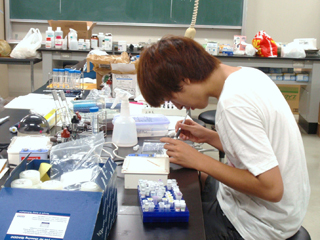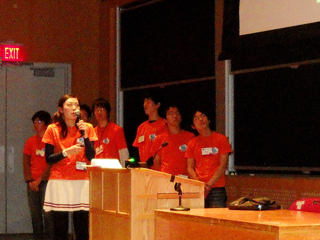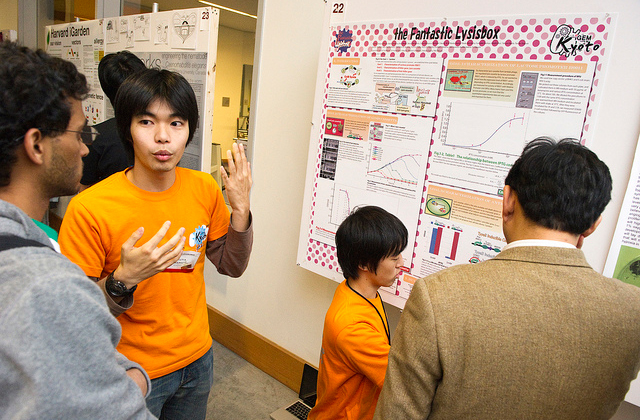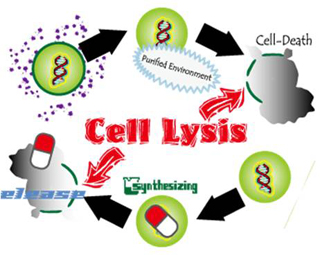November 5-8, 2010
iGEM (the International Genetically Engineered Machine competition) is an international competition in synthetic biology, mainly for undergraduate students, hosted by the Massachusetts Institute of Technology. In this competition, teams combine self-obtained genes with various genetic parts (Biobricks) sent from the iGEMS, to impart new functions to living cells such as Bacillus coli. Experiment results are posted on the Internet (wiki), and oral and poster presentations are given at MIT. The originality, novelty, social significance and degree of research completion are the competing points. The purpose of iGEM includes educating undergraduate students, so everything is done by the students, from setting the theme, formulating the experiment plan, conducting the experiment, modeling, creating the wiki, all the way to giving the presentation in English. Attracted by the intriguing nature of this competition, 130 teams from all over the world participated in iGEM 2010.

Group photo (Source: iGEM 2010, Mr. Justin Knight)
iGEM Kyoto University team was established in AY 2008; it has been reorganized with the addition of new members every year; this is its third year. Members are undergraduates from various faculties; graduate students and faculty members participate as advisers. For iGEM 2010, the team exploited their previous experiences in deciding the theme, experimenting, creating the wiki and giving the presentation at the finals (held at MIT), and was able to win a Gold Medal. Participating students made such comments as "things got difficult at times, but the difficulties helped us grow" and "I was able to experience something unique and special." This experience will surely help the students in various situations in the future. Next year, by addressing the newly identified issues, they hope to win the Grand Prize.
 Experimenting |  Presentation |
 At the poster presentation (Source: iGEM 2010, Mr. Justin Knight) | |
This year's project "Lysisbox"
Use of genetically engineered bacteria in the human body or in the ecosystem may have unexpected results (biohazards); therefore, genetically engineered bacteria have not yet been put to industrial use. So this year's iGEM Kyoto University team decided to create Lysisbox, an apoptosis control device that responds to the environment. The device is programmed so that the gene causing bacteriolysis (destruction and death of bacteria by disintegration of the cell wall) is activated in certain environmental conditions. Using the Lysisbox, genetically engineered bacteria can be terminated as soon as they have accomplished their intended tasks, thus preventing biohazards. Lysisbox may be applied to pharmaceuticals and deodorizers.

Application examples of Lysisbox
Guide to participation
Participating in iGEM allows students to experience the true pleasure of researching (setting your own theme, conducting experiments, creating mathematical models, presenting progress and results in various ways, etc.) while still being an undergraduate student. Aside from research, we conduct diverse activities, including creating websites, dispatching information through presentations at various events, etc. There is a role to play for everyone interested, whether you are from the humanities faculties or science faculties. Come join us! Briefings are being held on a regular basis. If you are interested, please drop by. We also await contact from any faculty members who would like to support or participate in our activities.
Contact information: igem.kyoto*gmail.com (please replace * with @)
Website(Japanese only): http://openwetware.org/wiki/IGEM:Kyoto
iGEM 2010 Kyoto University team members
Students
Wataru Shihoya (3rd year, Faculty of Science)
Makoto Kashima (4th year, Faculty of Science)
Naoi Okada (3rd year, Faculty of Science)
Tomonori Takada (3rd year, Faculty of Science)
Takuya Yamamoto (3rd year, Faculty of Science)
Yuki Maeda (3rd year, Faculty of Science)
Tomo Murayama (3rd year, Faculty of Pharmaceutical Sciences)
Kazuya Okada (2nd year, Faculty of Science)
Ken Kajita (2nd year, Faculty of Engineering)
Tasuku Sugiura (1st year, Faculty of Science)
Hitoshi Mori (1st year, Faculty of Agriculture)
Fumitaka Hashiya (1st year, Faculty of Science)
Takuya Okada (1st year, Faculty of Medicine)
Advisers
Hirohide Saito (Young Researcher Development Center (Hakubi Project) Program-Specific Associate Professor)
Akira Nabetani (Graduate School of Biostudies Assistant Professor)
Yoshihiko Fujita (Graduate School of Biostudies Assistant Professor)
Shinichiro M. Nomura (iCeMS/JST PRESTO researcher)
Kei Fujiwara (iCeMS/JST PRESTO researcher)
Miki Imanishi (Graduate School of Pharmaceutical Sciences Assistant Professor)
Ikuhiko Nakase (Graduate School of Pharmaceutical Sciences Assistant Professor)
Elizabeth Nakajima (English Coordinator for Global COE for Biodiversity and Evolution)
Shunichi Kashida (2nd year, Doctoral Program, Graduate School of Biostudies)
Eri Hayashi (2nd year, Master's Program, Graduate School of Medicine)
Supporters
Kenichi Yoshikawa (Graduate School of Science Dean)
Tan Inoue (Graduate School of Biostudies Professor)
Kunio Takeyasu (Graduate School of Biostudies Professor)
Masahiro Shirakawa (Graduate School of Engineering Professor)
Tokitaka Oyama (Graduate School of Science Associate Professor)
Miki Ebisuya (Graduate School of Medicine Career-Path Promotion Unit for Young Life Scientists Program-Specific Assistant Professor)
Guidance professor
Shin Yonehara (Graduate School of Biostudies Dean)

